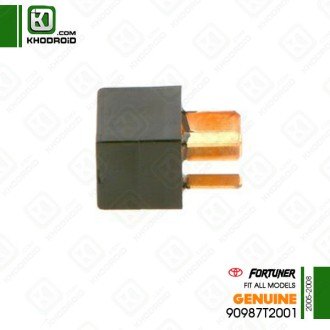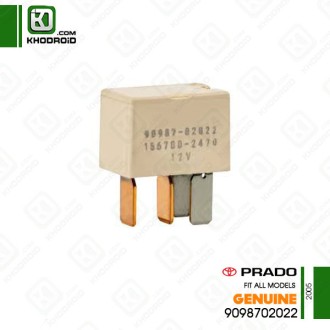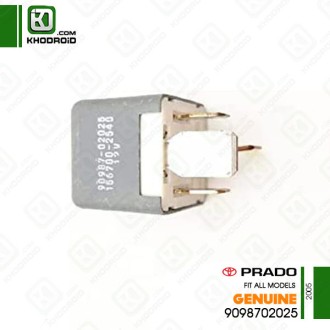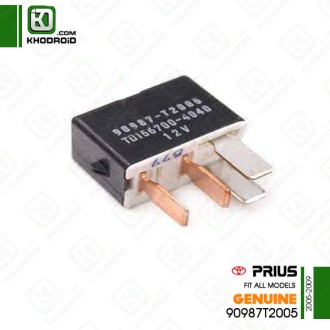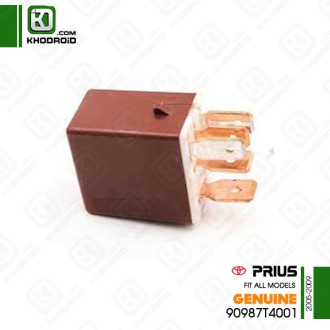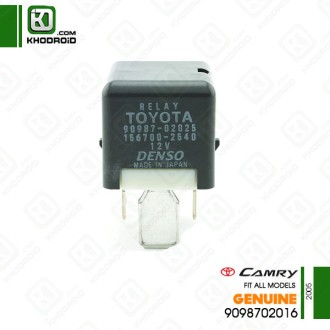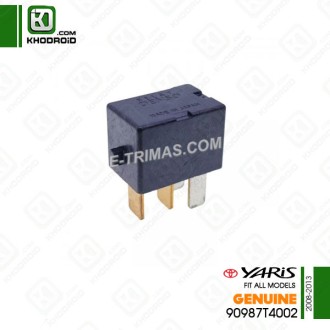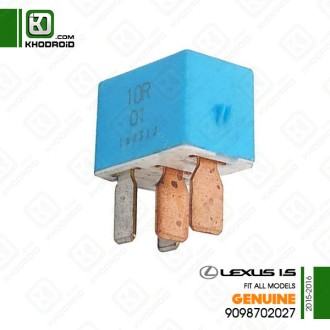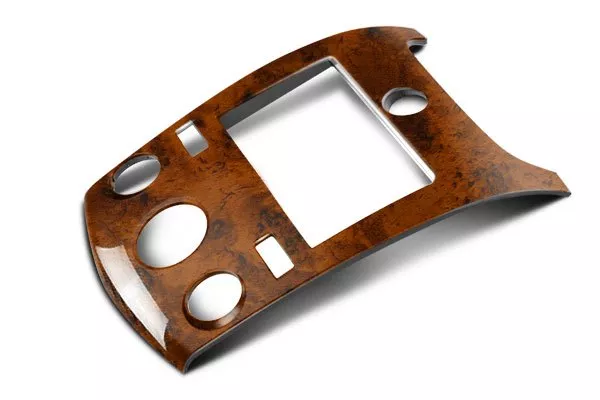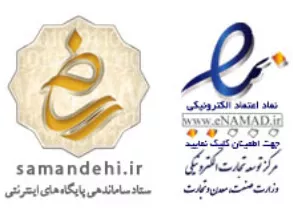دسته بندی ها
رله چراغ نیسان ورسا S 2010 | قیمت رله چراغ نیسان ورسا S 2010 | فروش رله چراغ نیسان ورسا S 2010 | انواع رله چراغ نیسان ورسا S 2010 | خرید رله چراغ نیسان ورسا S 2010 بسیاری از لوازم الکترونیکی دارای تغییراتی در داخل سنسور و رله و سیم کشی چراغ نیسان ورسا S 2010 | قیمت سنسور و رله و سیم کشی چراغ نیسان ورسا S 2010 | فروش سنسور و رله و سیم کشی چراغ نیسان ورسا S 2010 | انواع سنسور و رله و سیم کشی چراغ نیسان ورسا S 2010 هستند. نیسان ورسا S 2010 | لوازم یدکی نیسان ورسا S 2010 | لوازم نیسان ورسا S 2010 | قطعات نیسان ورسا S 2010 | قطعات یدکی نیسان ورسا S 2010 | لوازم اسپرت نیسان ورسا S 2010 ها را می توان برای تغییر یک ماشه جریان کم به جریان بالا، روشن یا خاموش کردن مدار، قطبیت معکوس و موارد دیگر استفاده کرد. هنگام اضافه کردن چراغهای ، مانند میلههای چراغهای خارج از جاده، چراغهای رانندگی/کار، یا سایر چراغهای کمکی به وسیله نقلیه، باید مداری اضافه کنید تا به اندازه کافی نور را تامین کند. رله ها روشی مقرون به صرفه و انعطاف پذیر برای انجام این کار هستند. درک اصول اولیه رله ها به نصب ها کمک می کند تا بسیار روان تر شوند و امکان سفارشی سازی در طول مسیر را فراهم کنند.آناتومی یک رله رله ها در اصل دو قسمت در یک بسته هستند. قسمت اول یک سیم پیچ القایی است این سیم پیچ تابع "ماشه" رله است. با اعمال هر دو مثبتو زمین روی کنتاکت ها، جریان از سیم پیچ عبور می کند. هنگامی که جریان از سیم پیچ عبور می کند، یک میدان مغناطیسی ایجاد می شود و سوئیچ را حرکت می دهد اینجاست که قسمت دوم رله وارد عمل می شود بخش دوم رله "سوئیچ" است. سوئیچ دارای سه رابط رابط مشترک، معمولی بسته و معمولی باز است. "به طور معمول" به وضعیت روشن نشدن رله اشاره دارد. حالت عادی با نشان می دهد که رله روشن نیست پین به ترمینال مشترک یا مدار باز متصل نیست. به طور معمول بست نشان می دهد که وقتی رله روشن نیست روشن، این پین به ترمینال مشترک یا یک مدار بسته متصل است. پین های یکدیگر متصل نیستند - فقط به پین به همین دلیل به آن ترمینال مشترک می گویند. رله برق دار و بدون برق سمت چپ: زمین وصل نیست - رله برق ندارد. راست: اتصال به زمین - رله برق دار سوئیچ از چپ به راست حرکت می کند رنامه های رله در حالی که رله ها را می توان تقریباً برای هر کاری استفاده کرد، برنامه های کاربردی بسیار مفید و ساده ای برای اضافه کردن نور به خودرو وجود دارد. لطفاً توجه داشته باشید که این سیمکشی فقط مربوط به رله است، نه سیمهای داخل خودرو. قبل از اتصال با سیم در خودرو، همیشه مطمئن شوید که ابتدا سیم را با یک مولتی متر دیجیتال تست کنید تا عملکرد مدار را تأیید کنید. سوئیچینگ مثبت سوئیچینگ مثبت برای برنامه هایی استفاده می شود که "ماشه" برای سوئیچ یا مدار شما مثبت است. این می تواند برای مثال یک سیم جرقه زنی، ترمز یا معکوس باشد. این می تواند برای کاربردهایی مانند میله های نور خارج از جاده، چراغ های کار، چراغ های ترمز اضافی و سایر روشنایی های بیرونی استفاده شود. سوئیچینگ منفی سوئیچینگ منفی برای برنامه هایی استفاده می شود که "ماشه" برای سوئیچ یا مدار شما منفی است. ماشه های منفی اغلب در ماشه های در، دریچه و صندوق عقب و همچنین بسیاری از کلیدهای داخلی یافت می شوند. این می تواند برای کاربردهایی مانند روشنایی محل پا، روشنایی تخت کامیون، روشنایی زیر کاپوت و سایر نورپردازی های داخلی استفاده شود.
..............................................................................................................
2010 nissan versa s light relay | 2010 nissan versa s light relay sale | 2010 nissan versa s light relay buy | 2010 nissan versa s light relay price Many electronics have changes inside 2010 nissan versa s | 2010 nissan versa s parts | 2010 nissan versa s accessory | 2010 nissan versa s parts sale | 2010 nissan versa s parts buy | 2010 nissan versa s parts price . Relays can be used to change a low current to high current trigger, turn the circuit on or off, reverse polarity and more. When adding lights, such as off-road lights, driving / work lights, or other auxiliary lights to the vehicle, you must add a circuit to provide enough light. Relays are a cost-effective and flexible way to do this. Understanding the basics of relays helps installations become much smoother and allow for customization along the way. Anatomy of a Relay Relays are basically two parts in a package. The first part is an induction coil. This coil is a "trigger" function of the relay. By applying both positive earth to the contacts, current flows through the coil. When current flows through the coil, a magnetic field is created and moves the switch. This is where the second part of the relay comes into play. The second part is the "switch" relay. The switch has three common interface interfaces, normally closed and normally open. "Normally" refers to the status of the relay not turning on. Normal mode indicates that the relay is not on. The pin is not connected to a common terminal or open circuit. The clamp typically indicates that when the relay is not on, the pin is connected to a common terminal or a closed circuit. The pins are not connected to each other - only the pin is therefore called a shared terminal. Electrical and no electrical relay on the left: The ground is not connected - there is no electrical relay. Right: Ground connection - Electric relay The switch moves from left to right. has it. Please note that this wiring is only for relays, not in-car wiring. Before connecting the wires in the car, always make sure to first test the wires with a digital multimeter to verify the operation of the circuit. Positive Switching Positive Switching is used for applications where the "trigger" is positive for your switch or circuit. This could be, for example, an ignition wire, brake or reverse. It can be used for applications such as off-road light bars, work lights, additional brake lights and other outdoor lighting. Negative switching Negative switching is used for applications where the "trigger" for your switch or circuit is negative. Negative triggers are often found on door, hatch and trunk triggers as well as many internal keys. It can be used for applications such as foot lighting, truck bed lighting, under-hood lighting and other indoor lighting.
https://www.khodroid.com/2010-nissan-versa-s-for-light-relay
مارا دنبال کنید
Copyright © 2016-2020 KHODROID.com. All rights reserved.
طراحی سایت توسط نونگار پردازش



